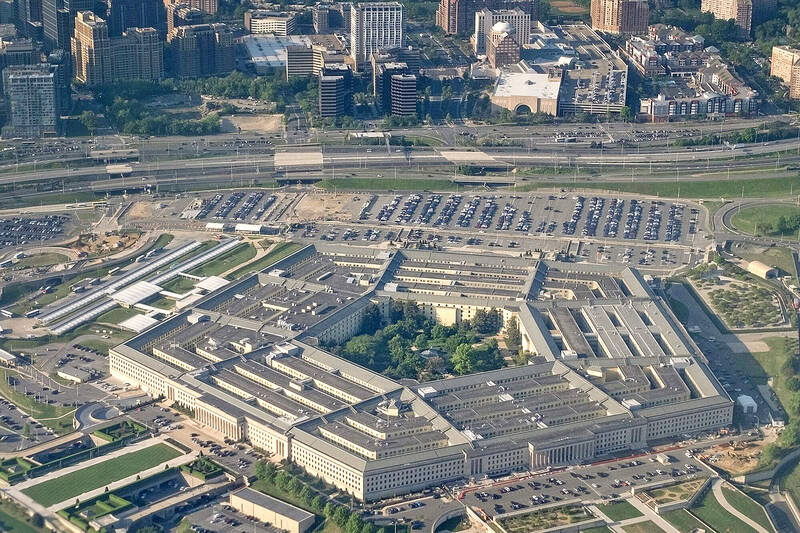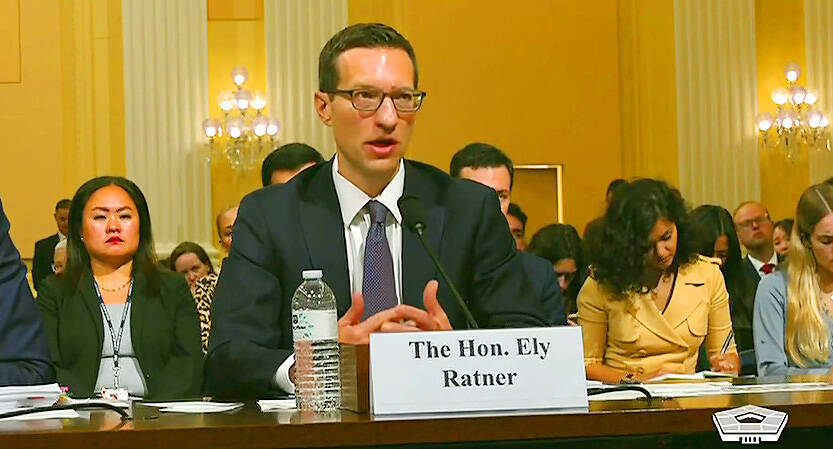A Chinese blockade of Taiwan would be a “monster risk” for Beijing and likely to fail, while a military invasion would be extremely difficult, senior Pentagon officials told the US Congress on Tuesday.
Growing worries of a conflict come as China has ramped up military pressure on Taiwan, holding large-scale war games simulating a blockade on the nation, while conducting near-daily warplane incursions and sending Chinese vessels around its waters.
US Assistant Secretary of Defense for Indo-Pacific Security Affairs Ely Ratner said a blockade would be “a monster risk for the PRC [People’s Republic of China].”

Photo: Bloomberg
“It would likely not succeed, and it would be a huge risk of escalation for the PRC, where it would likely have to consider whether or not it was willing to ultimately start attacking commercial maritime vessels,” Ratner told the US House of Representatives Armed Services Committee.
“A blockade would be devastating to the international community and would likely induce the broad-based wide deep response from the international community ... that Beijing would likely be trying to avoid,” he said.
He was echoed by US Army Major General Joseph McGee, a vice director of the Joint Staff.

Photo: Screen grab from a video on the US Department of Defense’s Web site
“It is an option, but it is probably not a highly likely military option... It is much easier to talk about a blockade than actually do a blockade,” McGee said.
“There is absolutely nothing easy about a PLA [Chinese People’s Liberation Army] invasion of Taiwan,” he said, pointing to the nation’s mountainous terrain and the Taiwan Strait separating it from China.
“They would have to mass tens of thousands, maybe hundreds of thousands of troops on the eastern coast, and that would be a clear signal,” McGee said, adding that combined amphibious and airborne air assault operations would be “an extremely complicated joint operation.”
“That would leave them in that [Taiwan Strait] gap, 90 to 100 miles [145km to 161km] — that would lead them susceptible to all the fire that could be brought to an invading force that was already telegraphing their intentions,” he said.
China’s latest massive show of force came on Monday, when Beijing sent more than 100 warplanes in 24 hours around the nation, prompting Taipei to decry its “destructive unilateral actions.”
Also during Tuesday’s hearing, Mira Resnick, US deputy assistant secretary of state for regional security in the Bureau of Political-Military Affairs, said a US government shutdown could affect foreign weapons sales and licenses to its allies, including Taiwan.
“This is something we would like to avoid,” Resnick said.
Her comments come as the US is less than two weeks from a potential government shutdown, as lawmakers struggle to agree on a short-term spending bill — an impasse that could also have repercussions on military and humanitarian aid to Ukraine.
Resnick said that in the past, the bureau had been unable to process new licenses or new military sales for any partner, including Taiwan, during a shutdown, except in an emergency.
Additional reporting by Reuters

CHAOS: Iranians took to the streets playing celebratory music after reports of Khamenei’s death on Saturday, while mourners also gathered in Tehran yesterday Iranian Supreme Leader Ayatollah Ali Khamenei was killed in a major attack on Iran launched by Israel and the US, throwing the future of the Islamic republic into doubt and raising the risk of regional instability. Iranian state television and the state-run IRNA news agency announced the 86-year-old’s death early yesterday. US President Donald Trump said it gave Iranians their “greatest chance” to “take back” their country. The announcements came after a joint US and Israeli aerial bombardment that targeted Iranian military and governmental sites. Trump said the “heavy and pinpoint bombing” would continue through the week or as long

TRUST: The KMT said it respected the US’ timing and considerations, and hoped it would continue to honor its commitments to helping Taiwan bolster its defenses and deterrence US President Donald Trump is delaying a multibillion-dollar arms sale to Taiwan to ensure his visit to Beijing is successful, a New York Times report said. The weapons sales package has stalled in the US Department of State, the report said, citing US officials it did not identify. The White House has told agencies not to push forward ahead of Trump’s meeting with Chinese President Xi Jinping (習近平), it said. The two last month held a phone call to discuss trade and geopolitical flashpoints ahead of the summit. Xi raised the Taiwan issue and urged the US to handle arms sales to

State-run CPC Corp, Taiwan (CPC, 台灣中油) yesterday said that it had confirmed on Saturday night with its liquefied natural gas (LNG) and crude oil suppliers that shipments are proceeding as scheduled and that domestic supplies remain unaffected. The CPC yesterday announced the gasoline and diesel prices will rise by NT$0.2 and NT$0.4 per liter, respectively, starting Monday, citing Middle East tensions and blizzards in the eastern United States. CPC also iterated it has been reducing the proportion of crude oil imports from the Middle East and diversifying its supply sources in the past few years in response to geopolitical risks, expanding

Pro-democracy media tycoon Jimmy Lai’s (黎智英) fraud conviction and prison sentence were yesterday overturned by a Hong Kong court, in a surprise legal decision that comes soon after Lai was jailed for 20 years on a separate national security charge. Judges Jeremy Poon (潘兆初), Anthea Pang (彭寶琴) and Derek Pang (彭偉昌) said in the judgement that they allowed the appeal from Lai, and another defendant in the case, to proceed, as a lower court judge had “erred.” “The Court of Appeal gave them leave to appeal against their conviction, allowed their appeals, quashed the convictions and set aside the sentences,” the judges